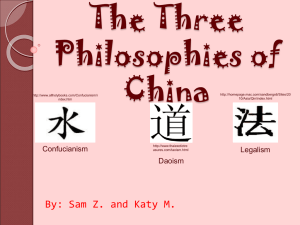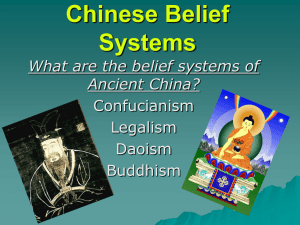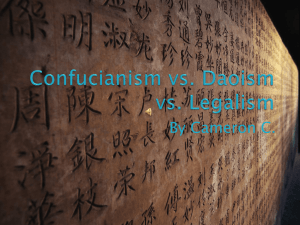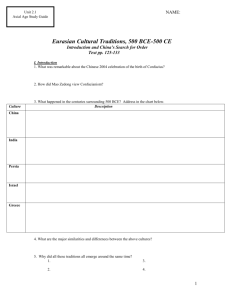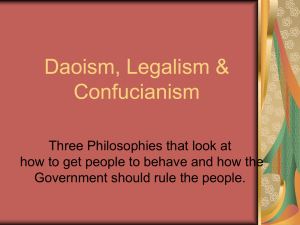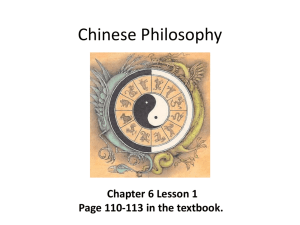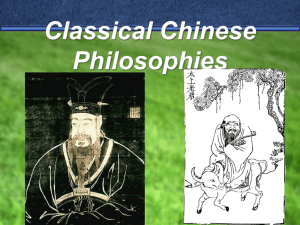Legalism
advertisement
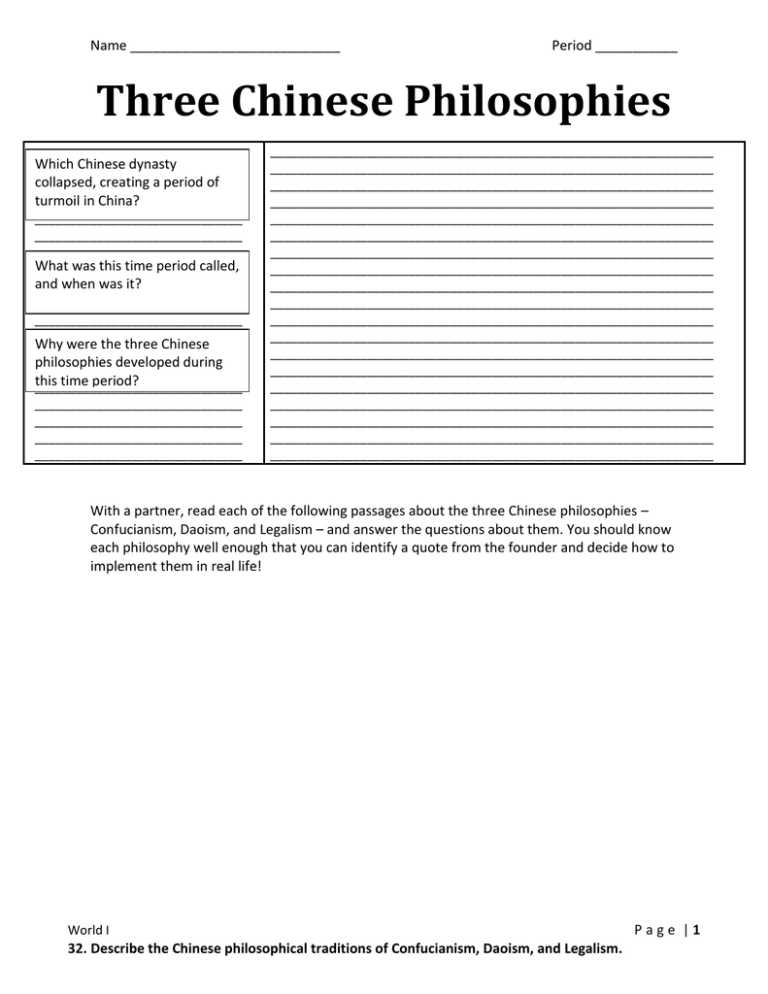
Name ____________________________ Period ___________ Three Chinese Philosophies ______________________________ Which Chinese dynasty ______________________________ collapsed, creating a period of ______________________________ turmoil in China? ______________________________ ______________________________ ______________________________ ______________________________ What was this time period called, ______________________________ and when was it? ______________________________ ______________________________ ______________________________ ______________________________ Why were the three Chinese ______________________________ philosophies developed during ______________________________ this time period? ______________________________ ______________________________ ______________________________ ______________________________ ______________________________ ________________________________________________________________ ________________________________________________________________ ________________________________________________________________ ________________________________________________________________ ________________________________________________________________ ________________________________________________________________ ________________________________________________________________ ________________________________________________________________ ________________________________________________________________ ________________________________________________________________ ________________________________________________________________ ________________________________________________________________ ________________________________________________________________ ________________________________________________________________ ________________________________________________________________ ________________________________________________________________ ________________________________________________________________ ________________________________________________________________ ________________________________________________________________ With a partner, read each of the following passages about the three Chinese philosophies – Confucianism, Daoism, and Legalism – and answer the questions about them. You should know each philosophy well enough that you can identify a quote from the founder and decide how to implement them in real life! World I 32. Describe the Chinese philosophical traditions of Confucianism, Daoism, and Legalism. Page |1 Unit: Classical Asia Chinese Philosophies Confucianism Confucianism is a system of belief, founded by a man named Kongfuzi, who is most commonly known as Confucius. He lived in a small state of Eastern China, during a turbulent time period in which lords were frequently fighting for land and power. Even though he experienced frequent war, Confucius held onto the belief that people were generally good, and not bad. This “goodness” that Confucius believed in, was necessary when describing his theory for a just and peaceful society. Confucius believed that in order for this type of society to exist, people had to follow certain roles in five basic relationships: ruler and subject, husband and wife, father and son, older sibling and younger sibling, and friend and friend. Another strong belief that Confucius taught was the importance of fulfilling obligations to your family, and honoring your ancestors. This concept is known as filial piety. Additionally, Confucius emphasized respect for the wisdom of scholars. The role of scholars, according to Confucius, is to work in the bureaucracy. In China, civil servants had traditionally been the sons of nobles. Under Confucianism, people believed that those working the government should be evaluated on ability. For example, these workers had to have knowledge not only of classical Chinese texts, but also know the proper behavior between basic relationships. In order to prove this knowledge, they had to take tests before being hired. This created an educated civil service in China. These beliefs, known as Confucianism, can still be seen today throughout China. 1. Who was Confucianism named after? 2. What was Confucius’ belief in the nature of human beings? 3. According to Confucius, what was the key to a just and peaceful society? 4. What is civil service? How did Confucianism change the way that workers were chosen within this system? Page |2 Unit: Classical Asia Chinese Philosophies Daoism Another system of beliefs that came out of classical China was Doaism. The founder of this philosophy was a great sage, or wise man, named Laozi. Many of Laozi’s thoughts and beliefs are found in his book Dao De Jing (The Classic of the Way and Its Powers). Known for its emphasis on harmony within nature, Daoism literally means “following the Way”. This belief system stressed that people achieved happiness and peace through living in harmony, or agreement, with the way of nature. To Daoists, nature was full of opposites like life and death, and light and dark. In fact, Daoism had a term for these opposites called yin and yang. When translated, yin means “shadowed” and yang means “sunlit”. To achieve harmony, you had to balance these opposites. Daoists believed that it is impossible to have the good without the bad, and therefore it was the job of the person to find a way to balance both. To help with this, Daoists preached a life of humility and simple living that came through meditation. People are not supposed to feel self-important or strive for possessions, but instead immerse themselves in finding the true inner peace as found in nature. This inner peace can only be achieved at your own pace, and cannot be guided by another. Because of the practice of individual discovery of the Way, Daoism preaches that too many laws and social rules are a bad thing. They believe that forcing people to act and telling people how to discover truth and harmony simply gets in the way of individual discovery, and therefore the best rulers are those who govern the least. As the famous Daoist saying goes, “Governing a large country is like frying a small fish. You ruin it with too much poking.” 1. Who was the founder of the philosophy of Daoism? 2. In Daoism, how does one achieve peace and harmony in their lives? 3. How did Daoists believe that a society should be governed? 4. What is the significance of the yin and yang? Page |3 Unit: Classical Asia Chinese Philosophies Legalism The third major philosophy that came out of classical China was called Legalism. Based on the teachings of a royal Han prince named Hanfeizi, Legalism was founded to address the growing concern of creating peace and order within society. In contrast with Confucianism, Legalism was founded under the belief that people are generally selfish and cannot be relied on. They believed that people will only pursue their own self interests and cannot be relied on to have a good influence on others. To combat this, it was necessary to have strict laws and enforce them with rewards for good behavior a, while giving harsh punishments for bad behavior. Legalism preached that civil servants should be watched carefully, and that those criticizing the government should be banished to the farthest reaches of China. These beliefs in the selfish interest of people also had its effects on government. At the time of Hanfeizi, rulers were frequently overthrown because new people wanted power. To solve this, Legalists said that rulers should have absolute power with the backing of the military to support their decisions. With one ruler who handed out severe punishments, it was believed that society would have their self interests kept in check. As Hanfeizi proclaimed, “People are submissive to power, and few of them can be influenced by doctrines of righteousness”. 1. Who was the founder of Legalism? 2. What did Legalists believe about the true nature of human beings? 3. What role did the government/ruler have under Legalism? 4. What was the best way to control people under Legalism? Page |4
